Sorted by date Results 1 - 25 of 126
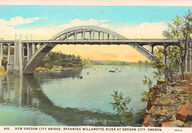
Conde McCullough had a problem. Let’s restate that. The Iowa highway department, which McCullough worked for at the time (in 1914), had a problem; what McCullough had was an opportunity. His solution to Iowa’s problem would, several years later, enable him to write his own ticket, and the name he would write on that ticket in the “destination” category would be “Oregon.” But at the time, that happy day was several years in the future and was far from certain. The problem the highway department...
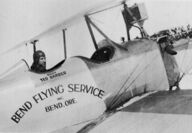
Continued From Last Week The Waco’s engine droned on. Ted couldn’t understand why it was still running. It should have sipped its last drop of gasoline several minutes ago. Sooner or later it would run out, and Ted would have to do his best at a dead-stick landing in the black, gusty night, unable to see the ground below. The most likely outcome would involve him thinking he was just above the ground when he wasn’t — it’s very hard to deliberately fly into the ground, and the instinct to pull ba...
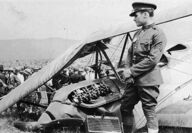
On a gusty late-summer evening in 1930, well after dark, a few feet off the ground near the Oregon-Nevada border, 22-year-old Ted Barber was hurtling through the blackness, preparing to die. Barber was an aviation pioneer and an actual barnstormer — a pilot who paid the bills by making the circuit of county fairs and country dances, selling airplane rides and flying lessons, and performing daring tricks like wing-walking and inverted low passes. His ”ship” was a Waco 9, a primitive but rugge...

Continued From Last WeekI In the course of doing this, Cressman gleaned an understanding of the cultures of “ancient Oregonians” — an understanding that formed into a theory that put him at odds with the conventional wisdom of nearly every other scientist at the time. Essentially, every archaeologist but Cressman was convinced that the Clovis People, an ancient culture named after a New Mexico town where their artifacts had been first discovered, had been the first humans to ever live in North...

In the summer of 1981, a little action-adventure movie titled Raiders of the Lost Ark came out, and fans have been speculating ever since on whom the character of Indiana Jones might be based. The most popular speculation — Vanity Fair magazine goes so far as to opine that he is “almost certainly” the basis for Jones — is Roy Chapman Andrews, a globe-trotting paleontologist and former director of the American Museum of Natural History. Well, the fact is that Jones probably wasn’t based on...

Up until his untimely death from a fall in 1937, Rogue River Wilderness mountaineer and mule-train driver Hathaway Jones enjoyed a reputation as the “damnedest liar” in all the West Coast states and probably a couple dozen inland ones too. And he was proud of that reputation. When the Portland Morning Oregonian referred to another backwoods character as the “biggest liar in the country,” Hathaway claimed he was going to sue the paper for defamation. (As a side note, that competitor for the “bi...
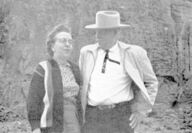
Part Two: Legendary raconteur Reub Long, the “Sage of Fort Rock,” packed a whole lot into his 76 years living in central Oregon. Most of it — though by no means all — had to do with horses. “The ranch I have and the things I’ve done were due to horses,” he wrote in his book. “I had workhorses for hire by contractors for freighting, haying, or construction jobs; I owned riding and pack horses for running dude outfits in the mountains; I raised riding horses to sell; I supplied bucking horses...
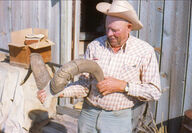
The tiny town of Fort Rock, Oregon, is famous for two things: The 14,000-year-old sandals found in a cave nearby, and Reub Long. It’s been a while — nearly 50 years since Reub died at age 76, in the summer of 1974. But even today, among old Oregon wits and raconteurs and cowboy poets, Reub plays number two to nobody. Perhaps Stewart Holbrook could have given him a run for the money; but Holbrook was a journalist, so his storytelling was constrained by a sense of duty to stick mostly to the fac...

Part Three “KLONDIKE KATE” ROCKWELL had visited Central Oregon before, and been deeply impressed by the beauty of the high desert. Now it seemed like just the place to get away from all things Vaudeville, to forget Pantages, to re-center herself. And she had friends there — although actually, she had friends almost everywhere, among the former sourdoughs of the Klondike gold rush. And, the Oregon High Desert country at that time (circa 1910) was one of the last parts of the continental U.S....

Part Two Kathleen Eloise Rockwell was born in Kansas in 1876 and grew up in Spokane and Valparaiso, Chile. At age 18 she left home, moved to New York, and took a job as a chorus girl. It was the start of a lifelong career as a dancer on the Vaudeville scene. The turn of the century found Kate in Spokane again, working in a variety of theaters there. And that’s where she was when she heard about the Klondike gold rush. She was adventuresome, athletic, and young, and the Klondike offered her t...

Part One Imagine this story playing out on a television or movie screen near you (or a Vaudeville stage!): Fade in on a tall, rugged-looking woman in a bright-red “Sergeant Preston of the Yukon” outfit. We hear a voiceover from a gravel-voiced Narrator: Narrator: “It’s June of 1901. In the Territorial capital of Whitehorse, ‘Klondike Kate Ryan’ is the first woman officer in the history of the Royal North-West Mounted Police, a precursor agency to the famous Royal Canadian Mounted Police, a.k.a....
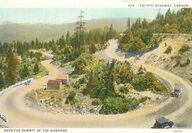
When Hasso Hering, the legendary longtime editor of the Albany Democrat-Herald, first came to Oregon in the mid-1960s, one of the things that struck him was the quality of the roads. “All the roads were wide and smooth and well built,” he said (or words to that effect; I don’t remember verbatim). “There were no potholes. You could go all day. You could drive your Mustang as fast as you wanted, and nobody would bother you. I’d never seen anything like it.” Oregonians of a certain age will know w...

As every sensible person knows, there is pretty much no such thing as being “cruel to be kind.” Sometimes it does work the other way around, though. Now and then you run across a story in which someone did something that was intended as a kindness, but turned out to be anything but. Such a case happened in the office of Oregon Governor Oswald West, sometime in 1912. It had to do with a little shooting scrape that Z.H. Stroud, an acquaintance of West’s, had gotten into in the little front...

Virgil settled down in Colton with Allie and tried to put down roots. He worked security for Wells Fargo & Co. — using a top-break revolver that he could reload one-handed — and opened a detective agency. Later he served as town constable and became famous for his even temper and his ability to de-escalate potentially deadly situations. His favorite less-than-lethal law enforcement technique, when force had to be used, was “buffaloing” — that is, pistol-whipping — unruly suspects. After the “ven...

Portland’s River View Cemetery is the state’s oldest nonprofit cemetery, founded in 1882 by three of Portland’s most prominent citizens: Henry Corbett, Henry Failing, and William S. Ladd. All three of them are buried there — Ladd’s grave in particular was the target of a bizarre raid by a gang of grave robbers 15 years later, but that’s a story for another time. In addition to the three of them, dozens of other Portland notables have their final resting place in this lovely pastoral necropolis....

Robert Franz came to the Illinois River Valley in 1921 for his health. Suffering from a degenerative lung disease — probably tuberculosis — he had been advised that moving into the Oregon wilderness, with its clean air and healthy climate, was his best shot at staying alive. That didn’t turn out to be true. To be fair, that wasn’t the climate’s fault — but I’m getting ahead of myself. Robert and his wife, Annanette Bruun Fantz, bought a big 72-acre piece of land on a natural terrace overl...

Signs and threats like the “COMITEE” warnings in the Klickitat Valley showed that this threat was being taken very seriously. Fortunately, though, the worst-case scenario was very rare. There were a few sheepherders who insisted on their right to plunder the public domain regardless of how the neighbors felt about it; but on the Western frontier, disagreements like this had a tendency to get worked out with fists and sometimes pistols. Overall, everyone grumbled, but they all managed to coe...

In the early 1880s, visitors in the Klickitat Valley, just across the Columbia River from The Dalles and Biggs Junction, recalled seeing some very singular signs posted regularly along the right-of-way: NOTISE: All land in woods past Draper Springs is for Settlers cattle. No sheep is allowed. Sheep men take notise. — Comitee By “Comitee,” it was clearly understood, the writer meant some sort of vigilance committee, a coalition of cattle ranchers and sodbusters who had come together to fight...

On September 14, 1964, the steamship Al Kuwait was moored at the dock in Kuwait City when something terrible happened: The ship capsized and settled to the harbor floor. This was bad enough news for the town by itself. But the real problem was, that Al Kuwait was a livestock transport freighter. It was full of sheep. Five thousand of them. These poor animals were, of course, drowned when the hull flooded. But then the carcasses started to decompose. This was an environmental disaster, because...

Sometime in April of 1960, a shy, retiring, hard-of-hearing comic-book artist named Carl Barks got a letter at his quiet suburban home. When he opened it, he found that it was a letter from a stranger named John Spicer. And to his astonishment, he found that it was — a fan letter. “Believe it or not, I have been planning this letter for about four or five years,” Spicer wrote. “I have been kept from doing so for the simple reason that I knew not your name or address. I tried several times, howev...

Ironically enough, it was on the first day of winter — the winter after the 1929 stock-market crash that kicked off the Great Depression — that Oregon inventor Thomas B. Slate’s dream of a business empire built on shiny silver steam-powered airships received its death blow. Slate had left his native state several years earlier and made a fortune by inventing and commercializing the production of “dry ice” — frozen carbon dioxide. Then he’d left, sold his company, and moved to Glendale, Cal...

One could think of late June and early July of 1968 in Cannon Beach as the Summer of the Dead Baby Birds. On June 28, at the height of the nesting season, a 23-year-old man from Portland had scrambled up the side of Haystack Rock, the iconic intertidal sometimes-island that towers nearly 200 feet over the beach and sea by Cannon Beach and gotten stuck at the top. It wasn’t common for people to climb the rock, but it wasn’t exactly unheard of either. The problem was, that it was a very dif...

In the small hours of the morning of Aug. 16, 1906, a powerful explosion jolted residents awake near the little town of Willamette, which today is a neighborhood of West Linn. It came from the direction of the nearby Tualatin River. The cause was soon discovered. When the first rays of the morning sun fell on the Oregon Iron and Steel Co.’s diversion dam, located a little over three miles from the river’s mouth, a 20-foot-wide hole had been blasted in its center. The river water was still gus...

Continued From Last Week Big League Chew (1977) Baseball players, back in the day, were somewhat famous for chewing tobacco on the field. Fans would see them pull a pouch of Red Man or Beech-Nut out of their uniform pocket, dip out a big pinch, and stuff it in “between the cheek and gum.” Sometimes it would even make a visible bulge. Minor-league slugger Rob Nelson probably chewed the stuff too, although he played for the Portland Mavericks; in Portland, as in most of the Pacific Northwest, mois...

Continued From Last Week The Tater Tot (1953) As we turn our attention to what food historian Heather Arndt Anderson calls “Oregon’s prodigal spud,” we are straying into distinctly non-Christmassy territory. And yet, in the few dozen short years since brothers Golden and Neef Grigg invented it, the Tater Tot has become as much a part of American comfort food as the Velveeta-drenched macaroni noodle. It all got started just after the Second World War when Golden and Neef rented a flash...